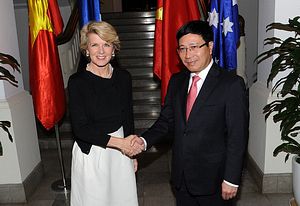For Australian foreign policy, 2014 was a year of crises management. The immediate and urgent responses to events such as the MH17 disaster, Martin Place siege, and terrorism threat by the Islamic State have taken precedence over Australia’s longer-term bilateral and multilateral priorities, most of which are squarely in the Indo-Pacific region.
While the risk of a terrorist attack on Australia by the disciples of Islamic fundamentalism aggrieved by Australian actions in the Middle East is real and immediate, fundamentally, Australian security and, no less importantly, prosperity are dependent on the stability of the Indo-Pacific. The region – largely peaceful and thriving – also displays increasing interstate rivalries and strategic, economic and social vulnerabilities, which threaten to derail the Indo-Pacific’s rise as a global center of power. A conflict or an economic and social upheaval, even largely localized, will have a disastrous impact on the delicate balance of power in the Indo-Pacific and its development.
It is the long-term issues of economic and social advancement and strategic stability of the Indo-Pacific region that will determine Australia’s success as a dynamic and resilient nation equipped to deal with internal shocks and external threats. Sketching the region’s players, developments and undercurrents reveals a remarkable mix of economic and social dynamism, connectivity, and diversity, but also strategic distrust, anxiety, and political fluidity.
In Indonesia, new President Jokowi Widodo has reaffirmed his country’s strong democratic credentials and is framing Indonesia’s foreign policy as the region’s capable maritime power. But he faces strong opposition in parliament and significant structural economic issues that he will be challenged to overcome.
Myanmar, lauded as a new emerging Asian democracy with untapped economic potential, has stumbled on its path to a genuinely inclusive and democratic society.
The military rule in the neighboring Thailand, while so far largely peaceful and stabilizing, continues to raise questions about Thailand’s longer-term democratic future.
New breath and confidence in the rise of India injected by Prime Minister Narendra Modi is a historic momentum to push much needed economic and social reforms and devise and pursue a foreign policy worthy of the country’s size, knowledge capacity, and ambition.
In Northeast Asia, a more assertive and coherent Japan – at least politically and strategically – has so far failed to jump-start its economy, amidst the political tensions and growing competition from its neighbors: Korea and China.
China, under the leadership of Xi Jinping, finds itself at a crossroads, balancing painful and breathtakingly large-scale economic reforms with the need to maintain the stability of its economic and political power structures. The dramatic shifts in China’s foreign policy from the low profile, “never taking the lead” approach to “big-country diplomacy” and building new China-led regional institutions are testing the Asian security and economic order. But China will also have to get better at its own balancing act between pursuing an assertive and cohesive foreign policy, including on territorial issues and the ongoing need for the benign external environment necessary for maintaining China’s economic growth.
Australia finds itself amidst the theater of vibrant economic interconnectedness and deep-seated strategic and political distrust. Australia is no longer a mere spectator, but because of its activism, geography, size and friendships it is a player and mediator, the role which will challenge its diplomatic, strategic and economic comfort levels, but will also make its voice in the region more influential.
In 2014, Australia has kicked some serious goals in the region: a trifecta of free-trade agreements with Japan, Korea and China; a professional and forward-looking leadership of G20; creative hosting of highly successful visits by the leaders of China, Japan and India – all marking new milestones in the relationships – and a steady and active program of regional diplomacy by the prime minister and his cabinet.
This tempo must continue in 2015. The tragedies of 2014 have shocked Australia. While MH17 highlighted the country’s vulnerability to events beyond its control and Australia’s global connectivity, the Martin Place siege has left a scar on the nation’s self-awareness – hopefully a scar not deep enough to tear at its multiethnic and multicultural fabric. However, these horrible events and the need to respond should not shake confidence in Australia’s future in the dynamic, yet complex Indo-Pacific neighborhood. Neither should it divert Australia’s political, economic and community attention for too long from the opportunities and uncertainties the Indo-Pacific presents.
Philipp Ivanov is inaugural Chief Executive Officer of the Asia Society Australia, based in Sydney. He was previously a policy officer at the Australian Government’s Department of Foreign Affairs. He is the Asia Literacy Ambassador at the Asia Education Foundation. Twitter: @philippivanov

































